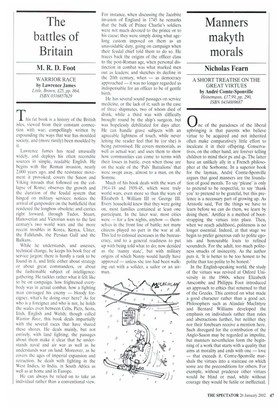The battles of Britain
M. R. D. Foot
WARRIOR RACE by Lawrence James Little, Brown, £25, pp. 864, ISBN 0316857629 This fat book is a history of the British isles, viewed from their constant connection with war; compellingly written by expounding the ways that war has moulded society, and (more rarely) been moulded by it.
Lawrence James has read unusually widely, and deploys his often recondite sources in simple, readable English. He begins with the Roman invasion, nearly
2000, years ago, and the resistance movement it provoked; covers the Saxon and Viking inroads that followed on the collapse of Rome; observes the growth and the duration of the feudal system that hinged on military services; notices the arrival of gunpowder on the battlefield that rendered the longbow obsolete; and carries right forward, through Tudor, Stuart. Hanoverian and Victorian wars to the last century's two world wars and the more recent troubles in Korea, Kenya, Ulster. the Falklands, the Persian Gulf and the Balkans.
While he understands, and assesses, technical change, he keeps his book free of service jargon; there is hardly a rank to be found in it, and little either about strategy or about great commanders, or about the fashionable subject of intelligencegathering. He tackles rather what it felt like to be on campaign, how frightened everybody was in actual combat, how a fighting man envisaged his enemy — bloody foreigner, what's he doing over here? As for who is a foreigner and who is not, he holds the scales even between Celts, Picts, Scots, Irish, English and Welsh; though called Warrior Race, this book deals impartially with the several races that have shared these shores. He deals mainly, but not entirely, with land fighting; the passages about them make it clear that he understands naval and air war as well as he understands war on land. Moreover, as he covers the ages of imperial expansion and retraction, he deals with fighting in the West Indies, in India, in South Africa as well as at home and in Europe.
He can always be relied on to take an individual rather than a conventional view. For instance, when discussing the Jacobite invasion of England in 1745 he remarks that the bulk of Prince Charlie's soldiers were not much devoted to the prince or to his cause they were simply doing what agelong custom imposed on them as an unavoidable duty, going on campaign when their feudal chief told them to do so. He traces hack the origins of the officer class to the post-Roman age, when personal distinction in combat was what marked men out as leaders; and sketches its decline in the 20th century, when — as democracy approached — it was no longer regarded as indispensable for an officer to be of gentle birth.
He has several sound passages on service medicine, or the lack of it; such as the case of three shipmates, two of whom died of drink, while a third was with difficulty brought round by the ship's surgeon, but was hopelessly debilitated for days after. He can handle grave subjects with an agreeable lightness of touch, while never letting the reader feel that he (or she) is being patronised. He covers memorials, as well as actual war; and uses them to show how communities can come to terms with their losses in battle. even when those are on the scale of the 'Pals' Battalions' that were swept away, almost to a man, on the Somme.
Much of his book deals with the wars of 1914-18 and 1939-45, which were truly world wars, even more so than the wars of Elizabeth I, William III or George III. Every household knew that they were going on, most families contained at least one participant. In the later war, most cities were — for a few nights, anyhow — themselves in the front line of battle; not many citizens played no part in the war at all. This led to colossal increases in the bureaucracy, and to a general readiness to put up with being told what to do; now derided as the 'nanny state', but with military origins of which Nanny would hardly have approved — unless she too had been walking out with a solider, a sailor or an airman.


















































































 Previous page
Previous page